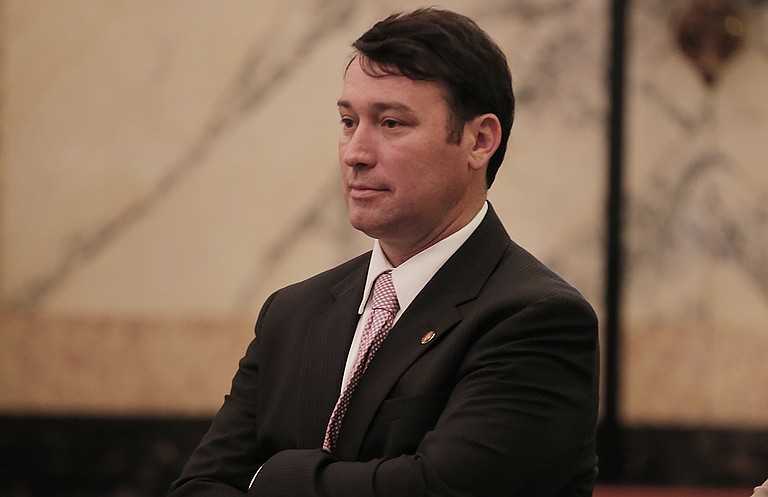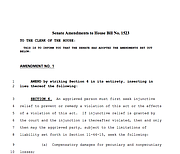Sen. Sean Tindell, R-Gulfport, amended the House's "Freedom of Conscience from Government Discrimination" bill, making it more difficult for those seeking recusal to get monetary damages. Photo by Imani Khayyam.
Thursday, March 31, 2016
JACKSON — Judges, magistrates and circuit clerks in Mississippi are one step closer to receiving immunity from refusal to issue marriage licenses or solemnize same-sex marriages if it goes against their "sincerely held religious belief" that marriage is between a man and a woman, sexual relations are reserved for that kind of marriage and sex is "determined by anatomy and genetics at time of birth."
The Senate passed House Bill 1523, the "Freedom of Conscience from Government Discrimination" bill," last night after over two hours of debate. Senate Democrats raised issues of discrimination, constitutionality of the bill and the slippery slope a bill like HB1523 could lead to in policies down the road for the Legislature.
Sen. Sean Tindell, R-Gulfport, chairman of the Senate's Judiciary A Committee, where the bill came from on the Senate side, amended the House bill, making it more difficult for those seeking immunity from under their "religious belief" defined in the bill to get monetary damages.
Tindell's amendment to the bill requires an "aggrieved person" under the act to seek injunctive relief in court first, which is a court-ordered act that does not involve money, before pursuing further legal action. An "aggrieved person" under this bill could be a person, religious organization, judge or circuit clerk who declines to provide services or do their duties based on a "sincerely held religious belief" that marriage should be between a man and a woman.
The amendment says that "if injunctive relief is granted by the court, and the injunction is thereafter violated, then and only then may," the aggrieved party seek compensatory damages, attorneys' fees or other relief. The Senate amendment also deleted the section of the bill that would have waived sovereign immunity, except in cases under the 11th Amendment.
Sen. Jenifer Branning, R-Philadelphia, presented the bill once Tindell's amendments passed, and Senate Democrats had a lot of questions. Branning said state religious leaders and organizations requested the legislation, in response to the U.S. Supreme Court ruling in the Obergefell case that legalized same-sex marriages in the United States last summer. In the course of debate, Branning said she is confident that the legislation is constitutional.
"The Obergefell decision is so new that states are beginning to enact their balancing legislation, which this is," Branning told the Senate.
Bill's Presenter: Discrimination Is 'Repulsive'
Sen. John Horhn, D-Jackson, pressed Branning on how the bill is actually discriminatory in nature. "Don't you think this is discrimination?" Horhn asked Branning.
"I don't think so," Branning said.
She went on to explain that the bill prevents businesses and business owners as well as circuit clerks from being discriminated against by the government in the form of fees or fines.
Black Senate Democrats questioned making laws based on religious conviction, pointing to other instances where religion was used as a basis for discrimination.
Sen. Derrick Simmons, D-Greenville, said that many bad things were done to African Americans and other individuals in the past based on what assailants considered to be their religious belief that races shouldn't mix.
"How do you respond to this may very well be the start of something that Mississippi doesn't need going forward regarding discrimination?" he asked Branning.
"In my book, any form of discrimination is repulsive, personally; that's not the way I live my life," Branning responded.
She went on to explain that she had served "homosexuals" at her law practice and gladly did so, but insisted that House Bill 1523 is more narrow and, thus, acceptable.
"This bill before us is on the specific issue of same-sex marriage. Now if a client were to come to me now and to ask for a pre-nuptial agreement of the same-sex marriage relationship, I would want the freedom to say, 'you know what, I don't feel comfortable doing this,'" Branning said. "I would politely decline, and I would offer a referral—this bill is designed to give people in our state that option."
Immunity and Recusal Problems
Some Democrats said that the parts of the bill that afford religious organizations and leaders immunity are not necessary and have little practical implication. Sen. Hob Bryan, D-Amory, said he was concerned about how the bill will affect circuit clerks in the state. HB 1523 requires any clerk recusing themselves from issuing a marriage license to take all steps necessary to ensure that that license "is not impeded or delayed as a result of any recusal." Bryan said he's not sure that in small clerk offices that there would always be a deputy to issue a license—and asked what would happen if the whole circuit clerk staff refused to issue same-sex marriage licenses.
"You're telling me that I have to go out and hire a deputy who will issue licenses—even though I don't have an opening for a deputy?" Bryan asked Branning.
Branning said that recusals were optional, and that if clerks feel strongly enough to not issue licenses, then they take on the burden to make the arrangements in the office to make sure someone does issue the license. "If it is too much of an imposition to hire additional staff, then that clerk may need to think about if that recusal is worth it financially or feasible for that office," Branning said.
HB 1523 requires clerks recusing to issue same-sex marriage licenses to file a written notice with the State Registrar of Vital Records.
Democratic senators offered three amendments to the bill; Tindell opposed all the amendments, and they all failed. Horhn offered an amendment to add a reverse-repealer, which would force the bill into conference. Simmons offered an amendment that would force any person or business recusing under the bill to prominently post at the business and in advertisements that they do so.
Sen. Barbara Blackmon, D-Canton, presented an amendment that would strike the part of the bill that defines sex of newborns at birth based on "anatomy and genetics." Blackmon said one in 4,500 children is born with both parts and assigned a gender as determined by doctors and parents at birth.
After the amendments failed, several senators spoke on the bill. Horhn echoed Sen. Derrick Simmons' earlier comments about how religion has been used in the past to hurt others, citing Ephesians 6:5, which he said slave owners used to allow slavery.
"Religion isn't always right about things; isn't always just about things, because people use religion," Horhn said. "We don't need to put another stain on Mississippi and demonstrate to the rest of the world how backwards we are in our thinking."
The bill passed by a vote of 32-17, along party lines—save two Democrats voting for the bill. Horhn entered a motion to reconsider on the bill, which will head back to the House for reconsideration.
Lt. Gov. Tate Reeves said the bill protects pastors and religious liberty.
"In the wake of last year's U.S. Supreme Court decision, many Mississippians, including pastors, wanted protection to exercise their religious liberties," Lt. Gov. Reeves said in a statement after the vote. "This bill simply protects those individuals from government interference when practicing their religious beliefs."
The ACLU of Mississippi, the Human Rights Campaign, the National Association of Social Workers (Mississippi Chapter) and 75 percent of Millsaps College faculty (Reeves' alma mater) have come out against the bill.
Correction and Update: An earlier version of this story said "aggrieved couple" in paragraph 2 where it should have said an "aggrieved person" under the Act. We apologize for the error and confusion. This story has been updated for clarity.
Email state reporter Arielle Dreher at [email protected]. Read more Mississippi LGBT coverage at jfp.ms/lgbt.



Comments
Use the comment form below to begin a discussion about this content.
Sign in to comment
Or login with:
OpenID